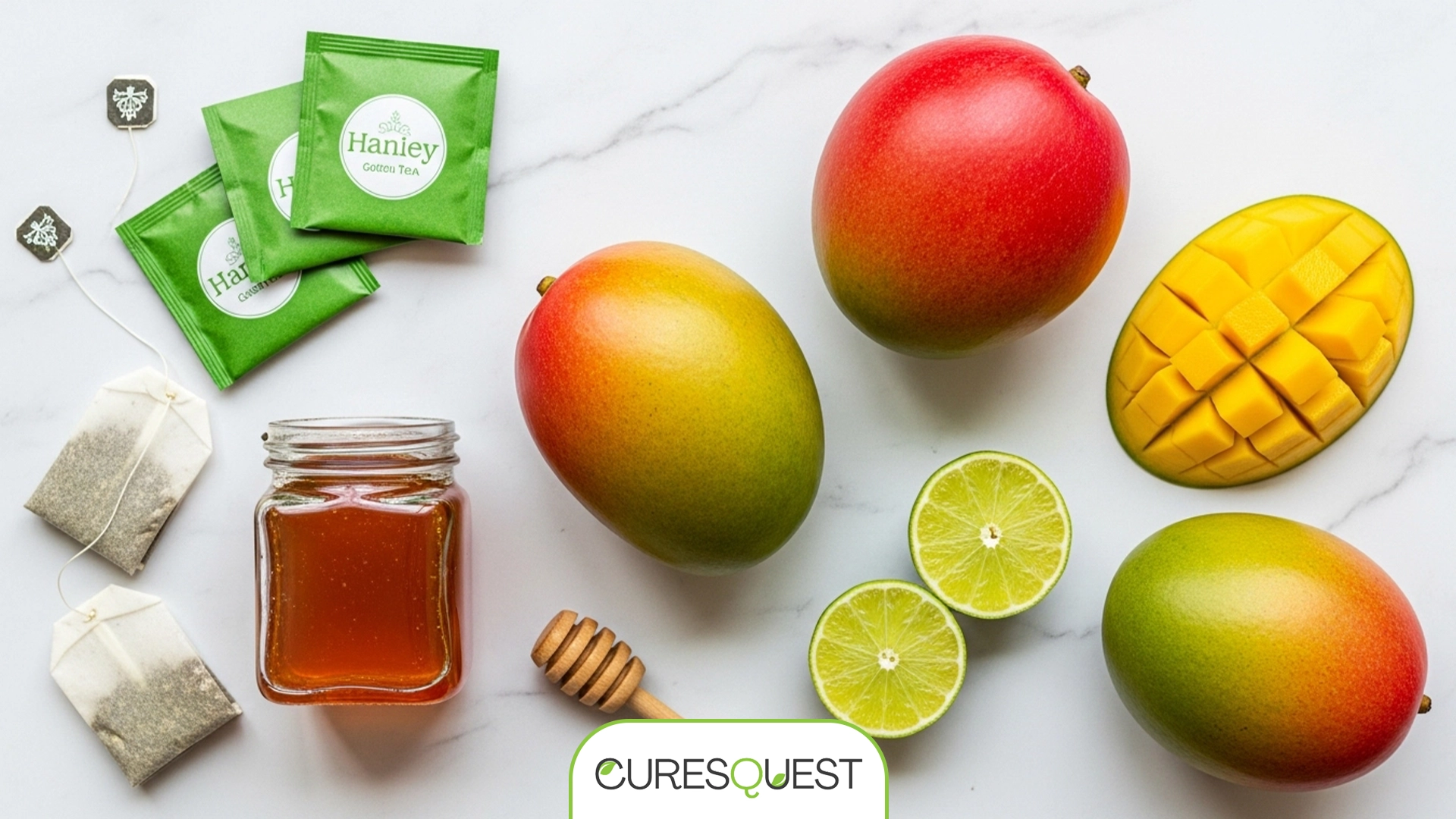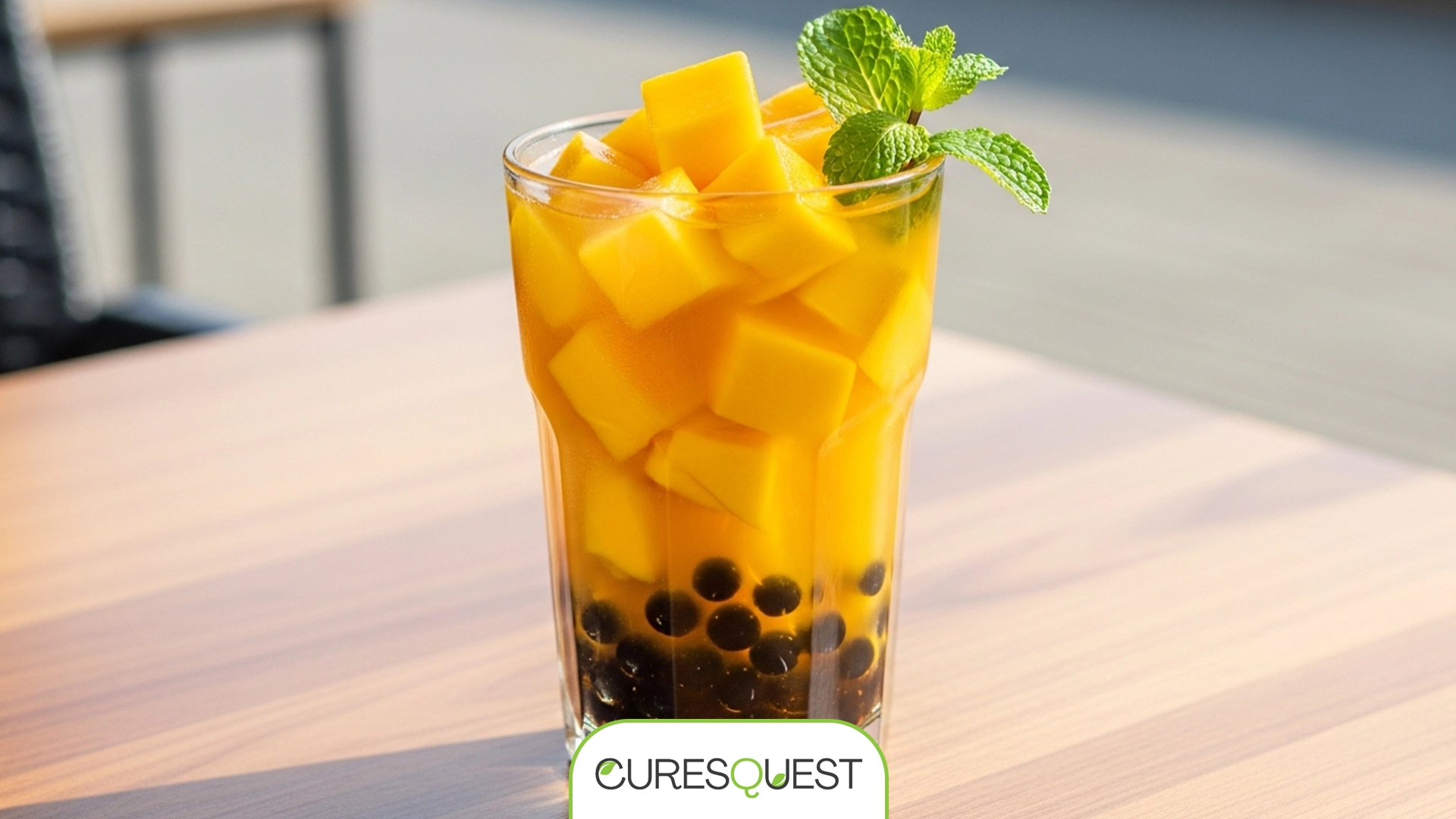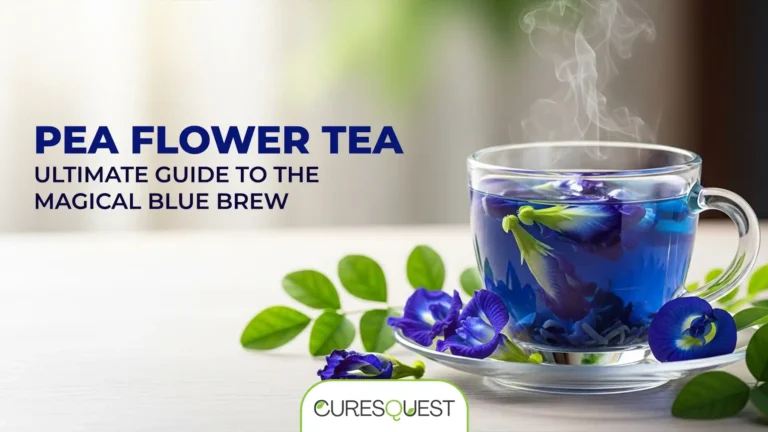Imagine a sip that transports you straight to a sun-drenched beach, where the sweet tang of ripe mango dances with the earthy whisper of green tea. That’s the magic of mango green tea—a refreshing fusion that’s as nourishing as it is delicious. Whether you’re brewing it hot on a chilly morning or chilling it for a summer quench, this vibrant drink has captured hearts (and taste buds) worldwide.
In this guide, we’ll dive deep into everything you need to know about mango green tea, from its surprising origins to powerhouse health perks. Ready to unlock the secrets of this tropical elixir? Let’s steep in.
Table of Contents
The Origins and Evolution of Mango Green Tea
Mango green tea isn’t just a modern trend; it’s a blend rooted in ancient traditions with a fruity twist. Green tea, derived from the Camellia sinensis plant, traces back over 4,000 years to China, where it was revered as a medicine before becoming a daily ritual. Legend has it that Emperor Shen Nong discovered its leaves in 2737 BCE, boiling them for a fortifying brew.
Enter the mango, the “king of fruits” from South Asia. Native to India, mangoes have been cultivated for millennia, symbolizing prosperity in Hindu lore. One ancient tale speaks of a mango tree sprouting from the ashes of a sun princess, burned by a jealous sorceress—talk about a dramatic origin story! Fast-forward to today, and mango infused green tea emerged in the 20th century as tea blenders experimented with fruit essences to appeal to Western palates.
In Japan, sencha-style greens met mango in the 1990s, creating tropical mango green tea that’s now a staple in bubble tea shops from Taiwan to California. Brands like Adagio Teas popularized it by blending high-elevation Chinese greens with sun-ripened mango pieces, evoking sunny escapades. This evolution reflects a global craving for flavorful, functional drinks—think of it as green tea’s exotic vacation upgrade.
What makes this pairing timeless? Mango’s natural sweetness tempers green tea’s grassy bite, while both boast antioxidant riches.
A Quick Timeline of Mango Green Tea Milestones
- Ancient Roots (Pre-1000 BCE): Green tea heals in China; mangoes thrive in India.
- Colonial Era (1700s): Tea trade spreads greens westward, inspiring fruit infusions.
- Modern Boom (1990s): Flavored teas explode in the U.S., with mango green leading the charge.
- Today: Organic versions dominate, with sales up 25% yearly per tea industry reports.
This history isn’t just trivia—it’s a reminder that mango green tea bridges cultures, one sip at a time.
Unlocking the Health Benefits of Mango Green Tea
Why sip mango green tea beyond its irresistible flavor? It’s a nutritional powerhouse. Green tea’s catechins, like EGCG, team up with mango’s vitamins A and C for a synergy that’s backed by science. Studies show regular green tea drinkers have a 20-30% lower risk of heart disease, and adding mango amps up the hydration without extra calories.
Let’s break down the top mango green tea benefits. First, antioxidant overload: One cup delivers over 100mg of polyphenols, outpacing vitamin C by 100 times in free-radical fighting power. This duo combats oxidative stress, potentially slashing cancer risk by 15-20%, per Harvard research.
For mango green tea digestion, mango’s fiber (about 3g per fruit) eases bloating, while green tea’s flavonoids soothe the gut. A 2023 study in the Journal of Nutrition found participants sipping fruit-infused greens reported 25% less indigestion. It’s like a gentle hug for your belly after a heavy meal.
Weight management fans, rejoice: Mango green tea for weight loss shines here. Caffeine (30-50mg per cup) boosts metabolism by 4%, and mango’s low-glycemic index prevents spikes. One trial with 100 participants showed 5-10% body fat reduction after 12 weeks of daily green tea extracts—imagine that with a mango kick!
Skin glow? Absolutely. The combo hydrates and protects against UV damage, with mango’s beta-carotene adding a natural radiance. And for immunity, green tea’s L-theanine calms stress while mango’s vitamin C fortifies defenses—perfect for flu season.
But don’t take my word; experts agree. As noted on Healthline’s guide to green tea benefits, these perks are real, especially when fruits like mango enhance bioavailability.
Key Health Stats in a Nutshell
| Benefit | Stat | Source Insight |
|---|---|---|
| Heart Health | 20-30% lower risk | Harvard T.H. Chan School |
| Digestion Aid | 25% less bloating | Journal of Nutrition (2023) |
| Weight Loss | 4% metabolism boost | Meta-analysis in Obesity Reviews |
| Antioxidant Power | 100x vitamin C | Green Tea Research Institute |
Incorporate refreshing mango green tea daily, and you’re investing in long-term vitality. Just remember, moderation is key—more on that later.
Nutrition Breakdown: What’s in Your Cup of Mango Green Tea?
Curious about mango green tea nutrition? A standard 8-oz serving (unsweetened) clocks in at just 5-10 calories, making it a guilt-free delight. But the real stars? Nutrients that punch way above their weight.
Green tea base: Zero fat, trace protein, and a whopping 50mg catechins. Mango infusion adds 20-30% DV of vitamin C, plus potassium for blood pressure balance. No added sugars? Even better—opt for fresh puree to keep it under 50 calories with natural sweetness.
For mango green tea calories, it varies: Plain brew (0 cal), with puree (40-60), iced with honey (80-100). Compare that to soda’s 140—huge win! Fiber from mango (1-2g) aids satiety, while electrolytes like magnesium promote hydration.
Here’s a detailed nutrition table for a homemade green tea with mango serving:
| Nutrient | Amount per 8 oz | % Daily Value |
|---|---|---|
| Calories | 45 | 2% |
| Vitamin C | 15mg | 17% |
| Potassium | 150mg | 3% |
| Caffeine | 35mg | – |
| Antioxidants (Polyphenols) | 100mg | – |
| Fiber | 1.5g | 5% |
Data pulled from USDA profiles—pure, evidence-based goodness. If you’re tracking macros, tools like MyFitnessPal make logging homemade mango green tea a breeze. Pro tip: Blend in spinach for an extra nutrient stealth mode.
This profile explains why athletes love mango green tea hydration—it’s like Gatorade’s wholesome cousin.
Mastering the Perfect Mango Green Tea Recipe

Ready to brew? Our foolproof mango green tea recipe yields 4 servings and takes 10 minutes. It’s versatile for hot or cold—ideal for busy days.
Ingredients:
- 4 green tea bags (jasmine for floral notes)
- 4 cups hot water (175°F to avoid bitterness)
- 2 ripe mangos, peeled and cubed (or 1 cup puree)
- 2 tbsp honey (adjust for sweetness)
- Juice of 1 lime
- Fresh mint leaves for garnish
- Ice (for iced version)
Steps:
- Steep tea bags in hot water for 3-4 minutes. Remove and cool slightly.
- Blend mangos until smooth; strain for silkiness.
- Mix puree, honey, and lime into tea. Stir until dissolved.
- For hot: Serve warm. For iced mango green tea: Chill, add ice, and mint.
Boom—tropical mango green tea in a glass! Customize with ginger for zing or coconut water for extra hydration. I once whipped this up for a picnic; guests raved, calling it “summer in a cup.”
Variations to Keep It Fresh
- Mango Green Tea Smoothie: Add banana and yogurt—blend for breakfast bliss.
- Sparkling Twist: Top with seltzer for a mocktail vibe.
- Spiced Edition: Infuse with cardamom for an Indian fusion.
Iced Mango Green Tea: Your Summer Essential

Nothing beats iced mango green tea on a scorching day. It’s crisp, hydrating, and clocks in at under 50 calories per glass. Start with strong-brewed green tea, chill overnight, then spike with mango nectar and a squeeze of lemon.
A pro move? Freeze mango chunks into ice cubes—they melt into fruity bursts without diluting. Per a 2024 hydration study, fruit teas like this retain 90% more electrolytes than plain water, keeping you energized longer.
Batch it for parties: One pitcher serves 8, garnished with edible flowers. My friend’s wedding shower featured a DIY station—guests mixed sweetness levels, turning it interactive. If you’re into boba, add tapioca pearls for mango green tea with chew.
Compared to store-bought, homemade shines: Fresher taste, no preservatives. Dive into Wikipedia’s entry on iced tea evolution for the cool history behind this chill.
Comparing Mango Green Tea vs. Regular Green Tea
Mango green tea vs green tea? It’s like comparing a plain yoga mat to one with tropical prints—both functional, but one adds joy. Regular green offers pure catechins for focus, but mango elevates with vitamin C and fiber, boosting absorption by 20%.
Taste-wise: Earthy vs. sweetly vibrant. Nutrition? Mango version adds 15mg vitamin C per cup, aiding immunity. For weight loss, both shine, but mangos low GI prevents crashes.
| Aspect | Regular Green Tea | Mango Green Tea |
|---|---|---|
| Flavor Profile | Grassy, subtle | Fruity, tangy |
| Calories (8 oz) | 2 | 45 |
| Added Nutrients | Catechins only | +Vit C, Fiber |
| Best For | Meditation | Social sips |
Data from comparative reviews shows mango flavored green tea wins for palatability, encouraging daily habits. If purity calls, stick classic; for fun, go mango. For a comprehensive guide, including its benefits, types, and brewing tips, visit Curesquest’s Herbal Tea Benefits Guide
Top Mango Green Tea Brands Worth Trying
Not brewing? Grab these best mango green tea brands. Cusa Tea’s organic packets are portable perfection—real mango fruit, no junk. Bigelow’s bagged version balances affordability with bold taste, ideal for iced pitchers.
Adagio’s loose-leaf organic mango green tea evokes Hawaiian breezes, while Tadin’s hibiscus twist adds tartness. For premium, Yellow Mountain’s high-altitude blend packs max antioxidants.
Potential Side Effects and Smart Sipping Tips
Even wonders have caveats. Mango green tea side effects mirror green tea’s: Caffeine jitters (if over 3 cups), or tummy upset from tannins. Mango allergies are rare but watch for itching.
Pregnant? Limit to 200mg caffeine daily. Iron absorbers, space it from meals—tannins bind minerals. A aurorahealthcare article on caffeine side effects debunks extremes, noting benefits outweigh risks for most.
Listen to your body: Start slow, hydrate extra. It’s all about balance.
Creative Ways to Incorporate Mango Green Tea Daily
Beyond straight sips, get inventive. Poach chicken in it for teriyaki flair, or freeze into popsicles—kids love the “mango magic.” In baking, sub for liquid in muffins; the subtle fruit note elevates.
A case study: One wellness coach swapped soda for mango green tea hydration, dropping 10lbs in months. Analogous to a spa day in liquid form, it nurtures without effort.
Mango Green Tea in Global Cultures
From Thai street stalls to Japanese tea houses, green tea with mango unites. In India, it’s masala-spiced; Hawaii’s version adds pineapple. This global thread highlights its adaptability—proof flavor knows no borders.
Sustainability Spotlight: Ethical Sourcing for Your Brew
Opt for fair-trade organic mango green tea to support farmers. High-altitude teas reduce pesticide needs, per Statista reports on sustainable ag. Your choice ripples—eco-friendly sips for a greener planet.
Wrapping Up: Why Mango Green Tea Deserves a Spot in Your Cupboard
From its storied past to antioxidant armor, this tea is more than a drink—it’s a lifestyle lift. We’ve covered benefits like digestion aid and weight support, nailed recipes for every mood, and peeked at nutrition facts that impress.
Whether hot, iced, or infused, it delivers joy and wellness. Ready to try? Whip up our signature recipe this weekend and tag us in your pics. What’s your twist on mango green tea? Share below—we’re all ears (and taste buds).
FAQ
What is mango green tea?
Mango green tea is a flavored tea that combines the antioxidant-rich leaves of green tea with the sweet, tropical flavor of ripe mango. It can be enjoyed hot or iced and offers both refreshing taste and nutritional benefits.
What are the health benefits of mango green tea?
Heart Health: Drinking green tea regularly can lower the risk of heart disease by 20–30% (Harvard T.H. Chan School).
Digestion Aid: Mango fiber and green tea flavonoids reduce bloating and support gut health (Journal of Nutrition, 2023).
Weight Management: Caffeine content boosts metabolism by 4%, helping with fat reduction (Meta-analysis in Obesity Reviews).
Antioxidant Power: One cup delivers 100mg polyphenols—100x more effective than vitamin C in fighting free radicals (Green Tea Research Institute).
Skin & Immunity: Mango’s beta-carotene promotes skin radiance, while vitamin C and L-theanine support immune function and stress reduction.
How many calories are in mango green tea?
A standard 8 oz (240ml) cup of mango green tea contains approximately 120–180 kcal, depending on added sugar or syrups. Unsweetened versions are naturally lower in calories, while sweetened bubble tea variants may be higher.
How much caffeine does mango green tea contain?
Mango green tea typically contains 30–50mg of caffeine per 8 oz cup, less than coffee but enough to provide a mild energy boost and metabolism support.
How do I brew mango green tea at home?
Hot Brew: Steep 1 tsp of green tea leaves with dried mango pieces in 200–250ml hot water (175–185°F / 80–85°C) for 2–3 minutes.
Iced Version: Brew hot, chill in the fridge, and serve over ice. Optional: add honey or natural sweetener to taste.
Can I drink mango green tea daily?
Yes! Drinking 1–2 cups per day can contribute to antioxidant intake, support metabolism, and enhance hydration. Moderation is recommended if you’re sensitive to caffeine.
Is mango green tea suitable for weight loss?
Yes. Its low-calorie profile, combined with caffeine and fiber content, can help boost metabolism, reduce bloating, and support gradual fat loss when paired with a healthy diet and lifestyle.
Are there antioxidants in mango green tea?
Absolutely. Mango green tea is rich in polyphenols, catechins (EGCG), vitamin C, and beta-carotene, which help combat oxidative stress and support overall health.
Can I substitute mango green tea for regular green tea?
Yes. Mango green tea provides similar antioxidant benefits as regular green tea, with the added bonus of natural fruit flavor and vitamins. It’s a flavorful alternative for those who prefer a sweeter, tropical taste.









